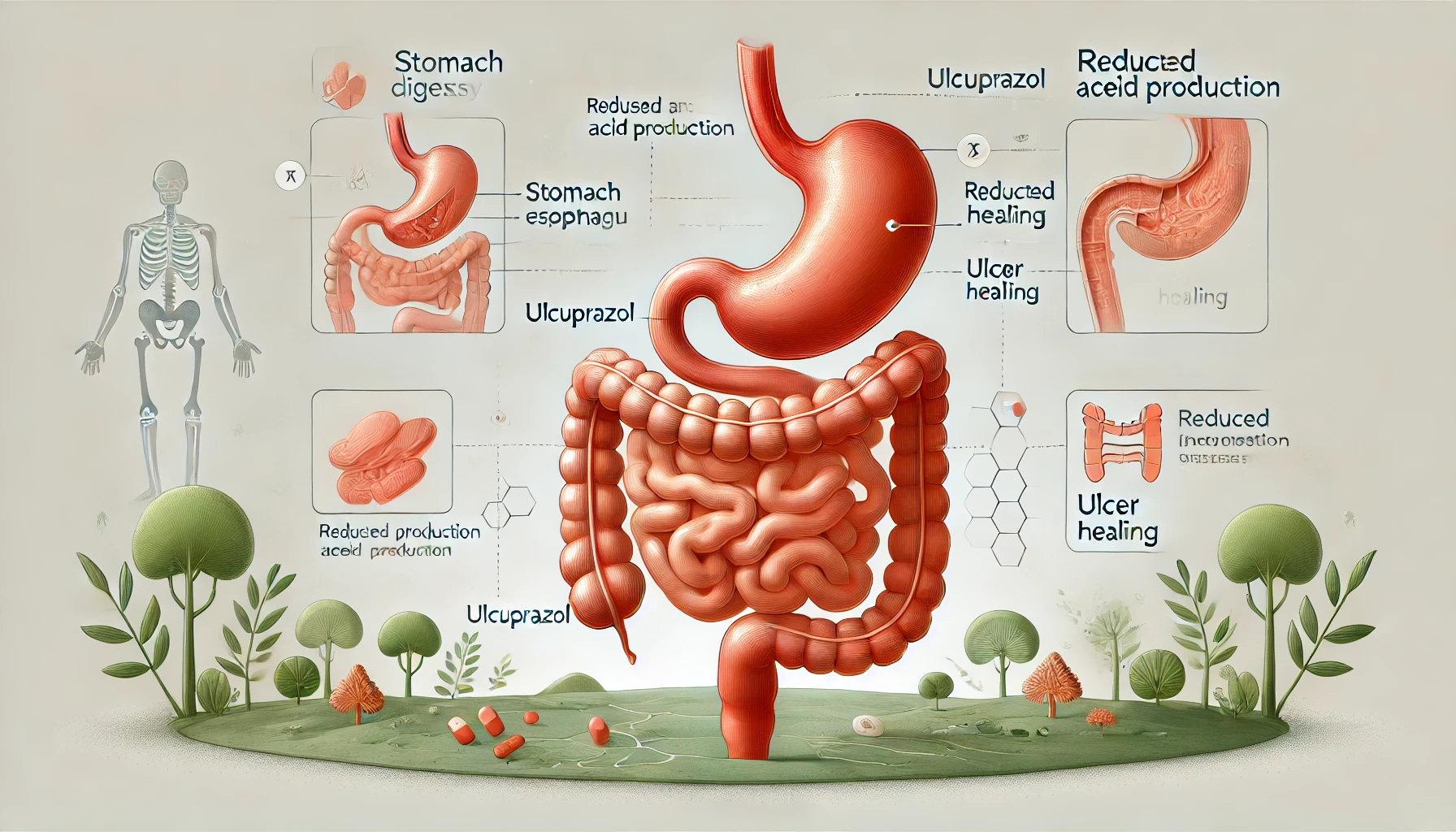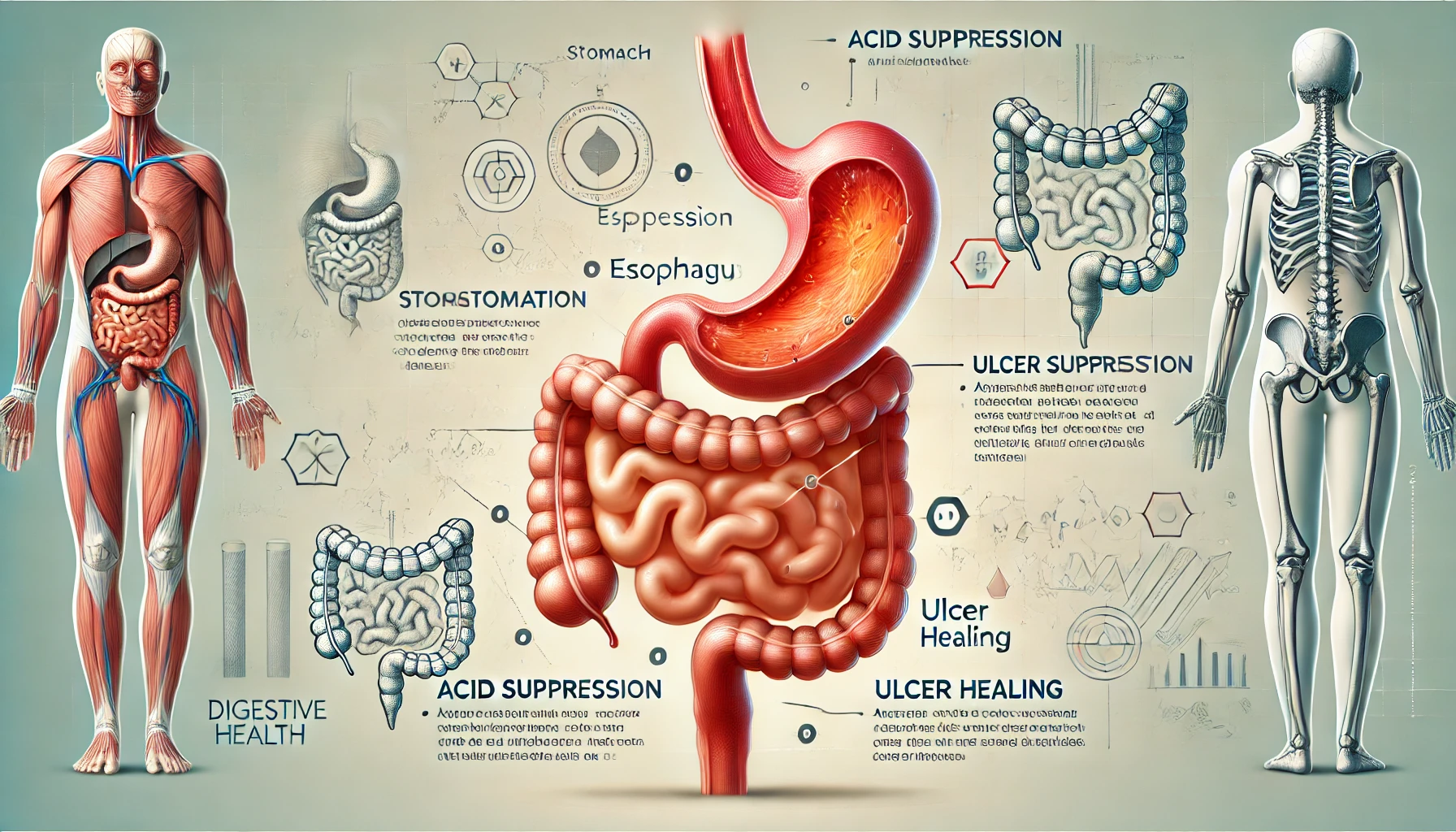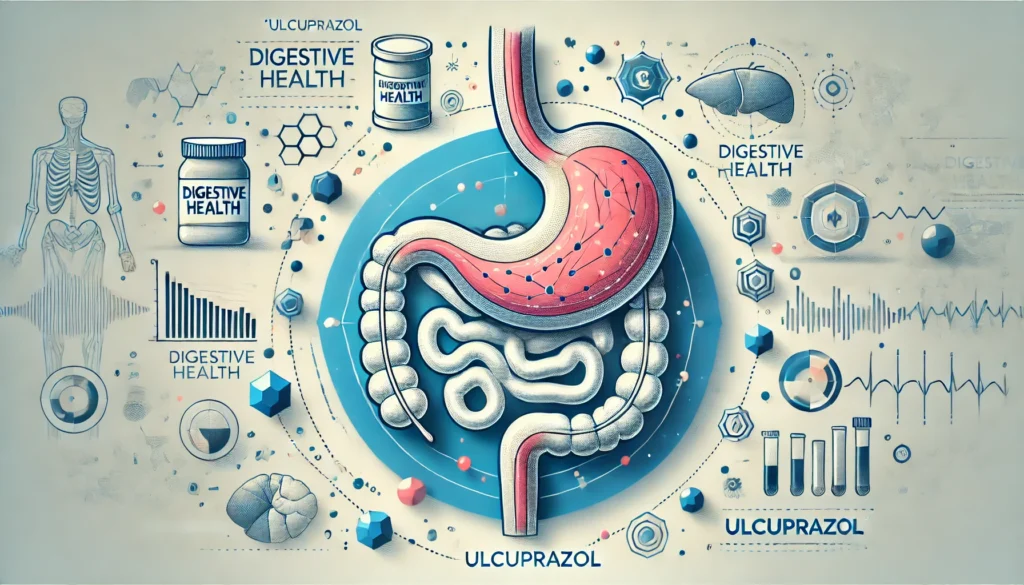Ulcuprazol is a well-established medication primarily used to manage various gastrointestinal disorders. As a proton pump inhibitor (PPI), it is designed to reduce stomach acid production, providing relief for conditions like gastroesophageal reflux disease (GERD), peptic ulcers, and other acid-related disorders. This medication has gained popularity due to its effectiveness in both short-term and long-term management of these conditions.
Mechanism of Action
Ulcuprazol works by targeting the proton pumps in the stomach lining. These pumps are responsible for the secretion of hydrochloric acid, which is essential for digestion but can cause damage when produced in excess. By inhibiting these pumps, Ulcuprazol significantly reduces the amount of acid in the stomach. This action helps in alleviating symptoms such as heartburn, acid reflux, and discomfort associated with ulcers. Unlike antacids, which neutralize existing acid, Ulcuprazol prevents the formation of acid, making it a more effective solution for long-term management.
Advantages of Using Ulcuprazol
Optimal Acid Control
One of the primary benefits of Ulcuprazol is its ability to provide consistent and sustained acid suppression. This is particularly important for individuals who experience frequent or severe symptoms, as it helps prevent damage to the esophagus and stomach lining. Studies have shown that Ulcuprazol maintains its effectiveness even with prolonged use, making it a reliable choice for chronic conditions.
Promotes Ulcer Healing
Ulcuprazol is highly effective in promoting the healing of peptic ulcers. By reducing acid production, it creates a more favorable environment for the stomach and duodenal lining to heal. This not only alleviates pain and discomfort but also reduces the risk of complications such as bleeding or perforation. For patients with a history of ulcers, Ulcuprazol can be used as a preventive measure to avoid recurrence.
Effective in Zollinger-Ellison Syndrome
Zollinger-Ellison Syndrome (ZES) is a rare condition characterized by tumors in the pancreas or duodenum that cause excessive acid production. This leads to severe peptic ulcers and other complications. Ulcuprazol is one of the most effective treatments for ZES, as it can significantly reduce acid levels and manage symptoms. Patients with ZES often require higher doses of Ulcuprazol compared to those with other conditions, but it remains a cornerstone of their treatment plan.

Prevents NSAID-Induced Gastric Ulcers
Nonsteroidal anti-inflammatory drugs (NSAIDs) are commonly used to treat pain and inflammation, but they can cause irritation and damage to the stomach lining, leading to ulcers. Ulcuprazol is often prescribed to individuals who need to take NSAIDs on a long-term basis, such as those with arthritis or chronic pain conditions. By reducing stomach acid, Ulcuprazol helps protect the gastric lining from the harmful effects of NSAIDs, reducing the risk of ulcer development.
Dosage and Administration
The dosage of Ulcuprazol varies depending on the condition being treated and the patient’s response to the medication. It is typically taken once daily, 30 minutes before a meal, usually in the morning. For some conditions, such as Zollinger-Ellison Syndrome, higher doses may be required, and the frequency of administration might be increased. It is crucial to follow the prescribed dosage and not to discontinue the medication without consulting a healthcare provider, as abrupt cessation can lead to a rebound effect, with a sudden increase in acid production.
Possible Side Effects
While Ulcuprazol is generally well-tolerated, some individuals may experience side effects. Common side effects include headache, diarrhea, constipation, nausea, and abdominal pain. These are usually mild and resolve on their own. However, long-term use of Ulcuprazol has been linked to more serious side effects such as:
- Vitamin B12 Deficiency: Prolonged suppression of stomach acid can interfere with the absorption of vitamin B12, leading to deficiency over time. This can cause symptoms like fatigue, weakness, and neurological issues.
- Osteoporosis and Bone Fractures: Long-term use of PPIs like Ulcuprazol has been associated with an increased risk of bone fractures, particularly in the hip, wrist, and spine. This is thought to be due to reduced calcium absorption.
- Kidney Issues: There have been reports of kidney problems, including acute kidney injury and chronic kidney disease, in individuals taking PPIs over a long period.
It is essential for patients to have regular check-ups and to discuss any concerns with their healthcare provider to ensure that the benefits of using Ulcuprazol outweigh the potential risks.
Considerations for Long-Term Use
Patients who require long-term use of Ulcuprazol should be aware of the potential risks and take steps to mitigate them. This includes:
- Periodic Evaluation: Regular assessments by a healthcare provider to monitor for any adverse effects and to ensure that the lowest effective dose is being used.
- Supplementation: In some cases, supplementation with calcium, vitamin D, or vitamin B12 may be recommended to prevent deficiencies.
- Lifestyle Modifications: Adopting lifestyle changes that reduce acid reflux, such as avoiding large meals, staying upright after eating, and maintaining a healthy weight, can help minimize the need for prolonged medication use.
Alternative Treatments
For individuals who cannot tolerate Ulcuprazol or for whom it is not effective, there are alternative treatments available. These include:
- Blockers: Medications like ranitidine or famotidine can reduce stomach acid production by blocking histamine receptors in the stomach. While not as potent as PPIs, they are effective for mild to moderate symptoms.
- Antacids: Over-the-counter antacids like calcium carbonate can provide quick relief by neutralizing stomach acid. However, they are not suitable for long-term management.
- Lifestyle and Dietary Changes: In some cases, modifications to diet and lifestyle may be sufficient to control symptoms without the need for medication.
Enhancing Treatment with Lifestyle Adjustments
Combining Ulcuprazol with lifestyle modifications can greatly enhance its effectiveness and contribute to overall digestive health.
Diet Modifications
Certain foods can trigger or exacerbate acid reflux symptoms. It is advisable to avoid spicy foods, citrus fruits, caffeine, and carbonated beverages. Eating smaller, more frequent meals can also help prevent excessive acid production.
Managing Body Weight
Excess weight can put pressure on the stomach and cause acid to back up into the esophagus, leading to symptoms of GERD. Maintaining a healthy weight through diet and exercise can reduce this pressure and improve symptoms.
Reducing Smoking and Alcohol Intake
Both smoking and alcohol can weaken the lower esophageal sphincter, the muscle that prevents acid from escaping the stomach. Reducing or eliminating these can improve the efficacy of Ulcuprazol and reduce symptoms.
Adjusting Sleep Position
Elevating the head of the bed by 6-8 inches can prevent nighttime reflux by keeping stomach acid from flowing back into the esophagus. Sleeping on the left side can also help, as this position keeps the stomach below the esophagus, reducing the risk of reflux.

Common Myths and Misconceptions about Ulcuprazol
There are several misconceptions about the use of PPIs like Ulcuprazol that can lead to confusion or inappropriate use. Some of the most common myths include:
- “Ulcuprazol is only for short-term use.” While it is true that short-term use is preferred, many patients require long-term therapy to manage chronic conditions. The key is to use the lowest effective dose and to regularly evaluate the need for continued therapy.
- “It is safe to stop Ulcuprazol abruptly.” Stopping Ulcuprazol suddenly can lead to a rebound effect, where the stomach produces even more acid than before. It is important to taper the dose gradually under medical supervision.
- “All PPIs are the same.” While all PPIs work by reducing acid production, they can differ in terms of potency, duration of action, and side effect profiles. It is important to use the specific medication and dose recommended by a healthcare provider.
The Role of Ulcuprazol in Modern Healthcare
Ulcuprazol has become a mainstay in the treatment of acid-related disorders due to its efficacy and safety profile. It is commonly used in hospitals and clinics for the prevention and treatment of peptic ulcers, GERD, and other conditions. Its availability in both prescription and over-the-counter forms makes it accessible to a wide range of patients. As research continues to evolve, Ulcuprazol remains a key tool in the management of gastrointestinal health.
Future Perspectives
As the understanding of gastrointestinal health advances, new treatments and improved formulations of existing medications like Ulcuprazol are likely to emerge. Research is ongoing to develop more targeted therapies that provide effective acid suppression with fewer side effects. Additionally, there is interest in understanding the long-term effects of PPI use and finding ways to mitigate potential risks. These developments will continue to enhance patient outcomes and offer better management options for acid-related conditions.
Conclusion
Ulcuprazol remains a cornerstone in managing digestive health issues. When used appropriately and combined with lifestyle modifications, it can significantly improve the quality of life for individuals suffering from acid-related disorders. Regular consultations with a healthcare provider are essential to monitor its effectiveness and adjust treatment as necessary. With ongoing research and advancements in gastroenterology, the role of Ulcuprazol in digestive health management is likely to continue evolving, providing even more effective solutions for patients. For more information visit our website: Reporterun.com



